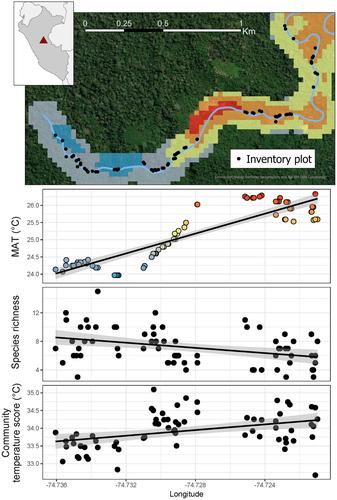当前位置:
X-MOL 学术
›
Glob. Change Biol.
›
论文详情
Our official English website, www.x-mol.net, welcomes your
feedback! (Note: you will need to create a separate account there.)
Hotter Temperatures Reduce the Diversity and Alter the Composition of Woody Plants in an Amazonian Forest
Global Change Biology ( IF 10.8 ) Pub Date : 2024-10-30 , DOI: 10.1111/gcb.17555 Riley P. Fortier, Alyssa T. Kullberg, Roy D. Soria Ahuanari, Lauren Coombs, Andrés Ruzo, Kenneth J. Feeley
Global Change Biology ( IF 10.8 ) Pub Date : 2024-10-30 , DOI: 10.1111/gcb.17555 Riley P. Fortier, Alyssa T. Kullberg, Roy D. Soria Ahuanari, Lauren Coombs, Andrés Ruzo, Kenneth J. Feeley

|
Rapid warming and high temperatures are an immediate threat to global ecosystems, but the threat may be especially pronounced in the tropics. Although low‐latitude tree species are widely predicted to be vulnerable to warming, information about how tropical tree diversity and community composition respond to elevated temperatures remains sparse. Here, we study long‐term responses of tree diversity and composition to increased soil and air temperatures at the Boiling River—an exceptional and unique “natural warming experiment” in the central Peruvian Amazon. Along the Boiling River's course, geothermally heated water joins the river, gradually increasing water temperature and subsequently warming the surrounding forest. In the riparian forests along the Boiling River, mean annual and maximum air temperatures span gradients of 4°C and 11°C, respectively, over extremely short distances (< 1 km), with the hottest temperatures matching those predicted for much of the Amazon under future global warming scenarios. Using a new network of 70 woody plant inventory plots situated along the Boiling River's thermal gradient, we observed a ca. 11% decline in tree α‐diversity per 1°C increase in mean annual temperature. We also found that the tree communities growing under elevated temperatures were generally more thermophilic (i.e., included greater relative abundances of species from hotter parts of the Amazon) than the communities in cooler parts of the gradient. Based on patterns at the Boiling River, we hypothesize that global warming will lead to dramatic shifts in tree diversity and composition in the lowland Amazon, including local extinctions and biotic attrition.
中文翻译:

高温会降低亚马逊森林中木本植物的多样性并改变其组成
快速变暖和高温对全球生态系统构成直接威胁,但这种威胁在热带地区可能尤为明显。尽管人们普遍预测低纬度树种容易受到变暖的影响,但关于热带树木多样性和群落组成如何应对高温的信息仍然很少。在这里,我们研究了树木多样性和组成对沸腾河土壤和空气温度升高的长期响应——这是秘鲁亚马逊中部一项特殊而独特的“自然变暖实验”。沿着沸腾河的河道,地热加热的水汇入河流,逐渐升高水温,随后使周围的森林变暖。在沸腾河沿岸的河岸森林中,年平均气温和最高气温在极短的距离(< 1 公里)上分别跨越 4°C 和 11°C 的梯度,最热的温度与未来全球变暖情景下亚马逊大部分地区的预测温度相匹配。使用位于沸腾河热梯度沿线的 70 个木本植物库存地块的新网络,我们观察到年平均温度每升高 1°C,树木α多样性就会下降约 11%。我们还发现,在高温下生长的树木群落通常比梯度中较凉爽地区的群落更嗜热(即,包括来自亚马逊较热地区的物种的相对丰度更高)。根据沸腾河的模式,我们假设全球变暖将导致亚马逊低地树木多样性和组成发生巨大变化,包括局部灭绝和生物损耗。
更新日期:2024-10-30
中文翻译:

高温会降低亚马逊森林中木本植物的多样性并改变其组成
快速变暖和高温对全球生态系统构成直接威胁,但这种威胁在热带地区可能尤为明显。尽管人们普遍预测低纬度树种容易受到变暖的影响,但关于热带树木多样性和群落组成如何应对高温的信息仍然很少。在这里,我们研究了树木多样性和组成对沸腾河土壤和空气温度升高的长期响应——这是秘鲁亚马逊中部一项特殊而独特的“自然变暖实验”。沿着沸腾河的河道,地热加热的水汇入河流,逐渐升高水温,随后使周围的森林变暖。在沸腾河沿岸的河岸森林中,年平均气温和最高气温在极短的距离(< 1 公里)上分别跨越 4°C 和 11°C 的梯度,最热的温度与未来全球变暖情景下亚马逊大部分地区的预测温度相匹配。使用位于沸腾河热梯度沿线的 70 个木本植物库存地块的新网络,我们观察到年平均温度每升高 1°C,树木α多样性就会下降约 11%。我们还发现,在高温下生长的树木群落通常比梯度中较凉爽地区的群落更嗜热(即,包括来自亚马逊较热地区的物种的相对丰度更高)。根据沸腾河的模式,我们假设全球变暖将导致亚马逊低地树木多样性和组成发生巨大变化,包括局部灭绝和生物损耗。




















































 京公网安备 11010802027423号
京公网安备 11010802027423号